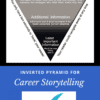
Joining a non-profit or becoming a member of a corporate board is an excellent way to boost your career. Apart from the fact that the experience will be personally rewarding, being a contributing board member also exhibits thought leadership and expertise in your core industry. It not only increases your perceived value but also helps in building your personal brand.
Landing a board position in an industry different from yours is another way to increase your influence. It reflects skills, strength in collaboration, governance, responsibility, management acumen, and a high-level decision-making ability on your resume.
Writing a resume for board positions is akin to a resume for any executive position, yet here are a few tips to make sure your resume stands above the crowd.
Do Your Research
This is a pivotal step necessary before applying to any position. Check out the organisation’s website, follow their social media trail, and read their press releases. Educating yourself about the core values of the organisation and their mission will give you a lot of good ideas on how to incorporate them in your resume so you appear beneficial and appealing to the key stakeholders. Churn that with your key qualifications and you have presented yourself as an excellent team member for their mission.
Research for such key positions might not be accomplished overnight. Connecting with people in your network who are associated with the organisation or business will help you learn more about their culture and how they operate. If there’s a way you can get involved, whether hosting a table at a gala, volunteering for their service day, or offering insight into their next big project, you’ll be able to get in front of the decision makers.
Showcase Your Board Experience
The format of your board resume matters just as much as it does on a traditional resume. While the layout may be similar, the order of your sections can differ. While traditional resumes often have board contributions at the bottom of a resume, it’s important to showcase your board experience at the top of your board-focused resume.
The order of your resume can be as follows:
- Name & Contact
- Title & Summary/Profile
- Director Education (if you have it)
- Board History
- Career History
- Education & Memberships
Highlight Your Key Accomplishments
When highlighting your accomplishments on your resume, especially at the executive level, it is key to showcase your overall value to the organisation looking to hire a board director. Information that translates well onto a board resume answers the questions: how did you lead your company towards success? What kind of budgets, teams, and projects did you manage and how did they perform? Going beyond your skills to highlight your progressive accomplishments will help you get attention from those seeking to fill the position.
Soft skills are also very important to highlight. Showing your commitment, passion, team leadership, and ability to read business reports and analytics is key to show that you’re well-rounded enough to help lead an organisation.
In addition, and similar to that of a traditional resume, quantify your achievements so the impacts you have made either for the organisation or for the community are understood easily by an outsider. Make the numbers work the magic for you!
- Raised $100K in donations through coordinating fundraising event that enabled organisation to provide food and shelter for 100 kids in Uganda.
- Supported 3 inner-city schools’ special needs programs by developing and authoring organisational fundraising proposal.
- Saved $500K and cut overhead 15% by analysing all expenses and developing companywide spending criteria including bulk buying and software expenditures.
A Director of the Board should be well rounded and able to understand the high-level underworking of a business. While you may be specialised in sales or operations, having a general understanding and experience in a variety of business entities will help show your overall ability to lead and make the key decisions required of a board member.
Consider Adding a Bio to Your Marketing Documents
A board-focused resume is a great way to get started on the path toward landing a board position, but a well-written biography can also specifically point out the ways in which your contributions helped shape the organisations you were a part of in a different way than a resume can. A biography shares your career narrative in a way that showcases the skills you learned, the accomplishments you’ve provided, and how you’re ready for the next step in your career.
Preparing your career marketing documents to land a board position can help you get in front of the people who are making the key hiring decisions. Working with a professional resume writer can help you sort out what needs to be included in your resume, LinkedIn profile, biography, and cover letter to best showcase your abilities.
Need help? At Total Resumes, we create brand-driven, achievement-focused documents for executives and aspiring leaders worldwide. With a 99% client interview-winning success rate, we are well-placed to help with your career advancement. Check some of our work here: https://www.totalresumes.com.au/samples-of-our-award-winning-work/

